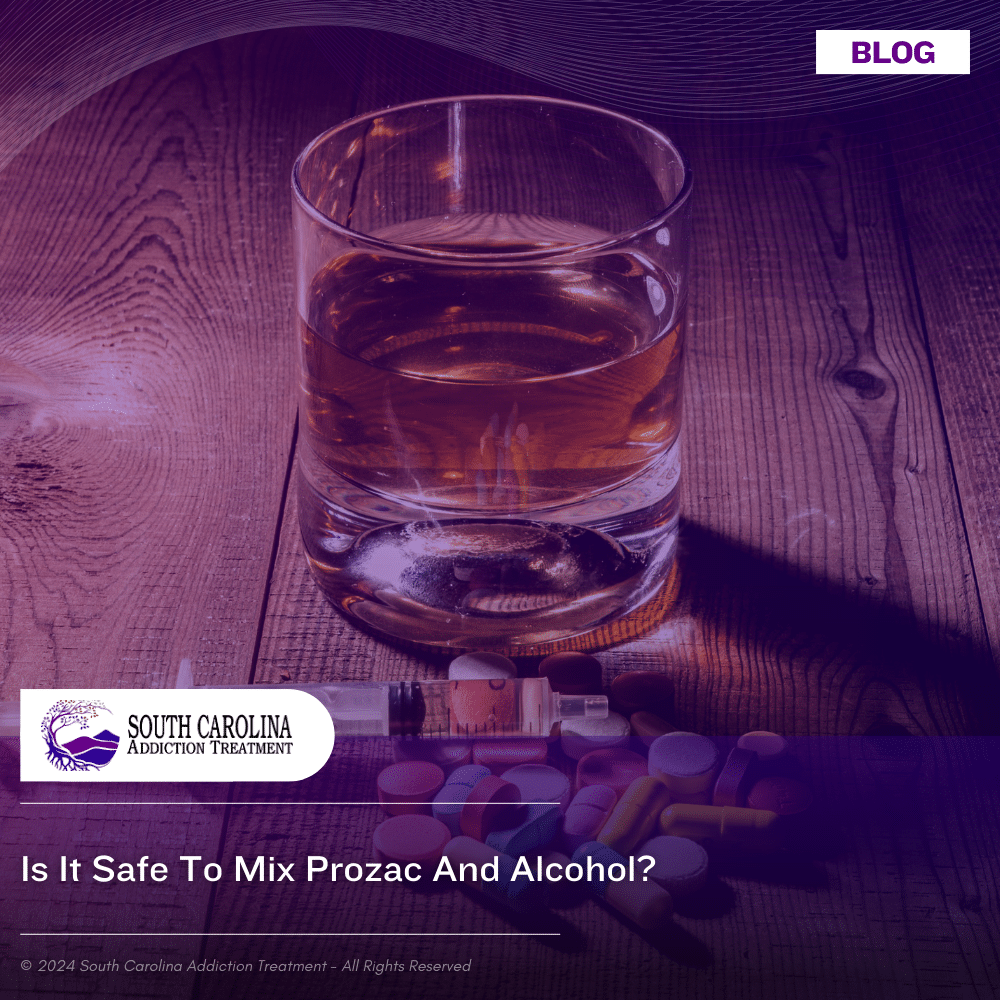Is it Safe to Mix Prozac and Alcohol?

Medically Verified: 2/1/24
Medical Reviewer
Chief Editor

All of the information on this page has been reviewed and verified by a certified addiction professional.
Drinking has become a permanent fixture in American culture. When someone has a hard day at work, they often reach for a glass of wine or a beer at the end of the day. During celebrations or normal weekend activities, many people engage in heavy drinking.
The National Institute on Alcohol Abuse and Alcoholism (NIAAA) reports that over 85% of adults have consumed alcohol at some point in their lives.[1]
While occasional alcohol consumption is okay, there are certain situations where any amount of alcohol can be dangerous. Many people take prescription medications daily, whether they are for medical or psychiatric conditions. Unfortunately, some of these medications have dangerous interactions with substances like alcohol.
Daily medications become a routine part of your life if you take them for a while, and sometimes you may forget to consider the interactions they could have with alcohol.
One of the medications you should avoid mixing with alcohol is known as Prozac, an antidepressant drug.
What is Prozac (Fluoxetine)?
Prozac is the brand name for an antidepressant medication called fluoxetine. This medication belongs to a class of drugs known as selective serotonin reuptake inhibitors (SSRIs). Medications like Prozac work by changing the way your brain processes serotonin, the hormone responsible for regulating feelings of happiness and anxiety.[2]
Prozac is commonly prescribed to treat the following conditions:
- Depression
- Anxiety disorders
- Post-traumatic stress disorder (PTSD)
- Eating disorders
- Obsessive-compulsive disorder (OCD)
In all of the above-mentioned conditions, serotonin tends to be dysregulated. Prazac balances levels of serotonin in the brain, significantly reducing symptoms of various mental health conditions.
Can You Mix Prozac and Alcohol?
While fluoxetine is a safe medication when your doctor prescribes it to you, mixing it with other substances like alcohol can lead to dangerous effects.
In addition to reducing the symptoms of depression, Prozac can produce a sedative or relaxing effect. People who experience co-occurring depression and insomnia may be prescribed this medication as it can help reduce the symptoms of both conditions. However, this sedative effect can become intensified if you mix fluoxetine with alcohol.
Both Prozac and alcohol produce symptoms of drowsiness. When combined, you could become exhausted, resulting in impaired judgment and motor skills. It’s already known that taking SSRIs can put you at risk of car accidents, and drinking alcohol with Prozac can substantially increase this risk.[3]
Alcohol can also increase the risk of other side effects associated with Prozac, including:[2]
- Anxiety
- Trouble sleeping
- Dry mouth
- Weight loss
- Nausea
- Diarrhea
- Sexual dysfunction
Even further, fluoxetine is an antidepressant while alcohol is a depressant. If you drink alcohol while you are suffering from depression, your symptoms can become worse. Drinking alcohol while taking an SSRI like Prozac can also make your medication ineffective, negating the purpose of the medication in the first place.
Understanding the Relationship Between Depression and Alcohol Abuse
While everyone experiences the symptoms of depression at some point in their lives, some individuals struggle with recurring and persistent symptoms of this condition. Untreated depression can lead to life-threatening effects, such as suicidal thoughts, ideation, and attempts. It is extremely important to seek professional help if you or a loved one suffers from depression or similar mental health issues.
Oftentimes, people who avoid seeking help for their depression look for other ways to cope, and some turn to binge drinking. The prevalence of depression among alcohol-dependent individuals is 68%.[4]
Because alcohol affects serotonin and dopamine in your brain, it can lead to short-term effects of happiness, anxiety relief, and lessened symptoms of depression. However, the more you abuse alcohol, the more your brain will struggle to produce serotonin on its own. In the long run, alcohol abuse worsens the symptoms of depression over time, even if it does provide short-term relief.[5]
Even if you do not experience negative interactions between Prozac and alcohol, drinking can significantly increase your symptoms of depression.
Find Help for Alcohol Abuse and Depression Today
If you or a loved one suffer from alcohol abuse or alcoholism, help is available. Long-term alcohol abuse can lead to an array of effects, including life-threatening organ damage, increased symptoms of mental illness, and fatal cases of alcohol poisoning. Attending an alcoholism treatment center can prevent you from experiencing these consequences by providing you with the support and tools you need to maintain long-term sobriety.
If you’re reading this, then there’s a good chance that you or someone you know is suffering from the disease of addiction. We’re here to help you overcome that affliction and we guarantee complete discretion. You don’t need to suffer in silence. South Carolina Addiction Treatment is a state licensed and CARF (commission on accreditation of rehabilitation facilities) accredited substance abuse treatment facility with a focus on mental health.
Don’t wait any longer for the help you deserve. Call today to get started.
References:
- https://www.niaaa.nih.gov/publications/brochures-and-fact-sheets/alcohol-facts-and-statistics
- https://medlineplus.gov/druginfo/meds/a689006.html
- https://www.ncbi.nlm.nih.gov/pmc/articles/PMC3853539/
- https://www.ncbi.nlm.nih.gov/pmc/articles/PMC3658562/
- https://www.ncbi.nlm.nih.gov/pmc/articles/PMC6799954/

